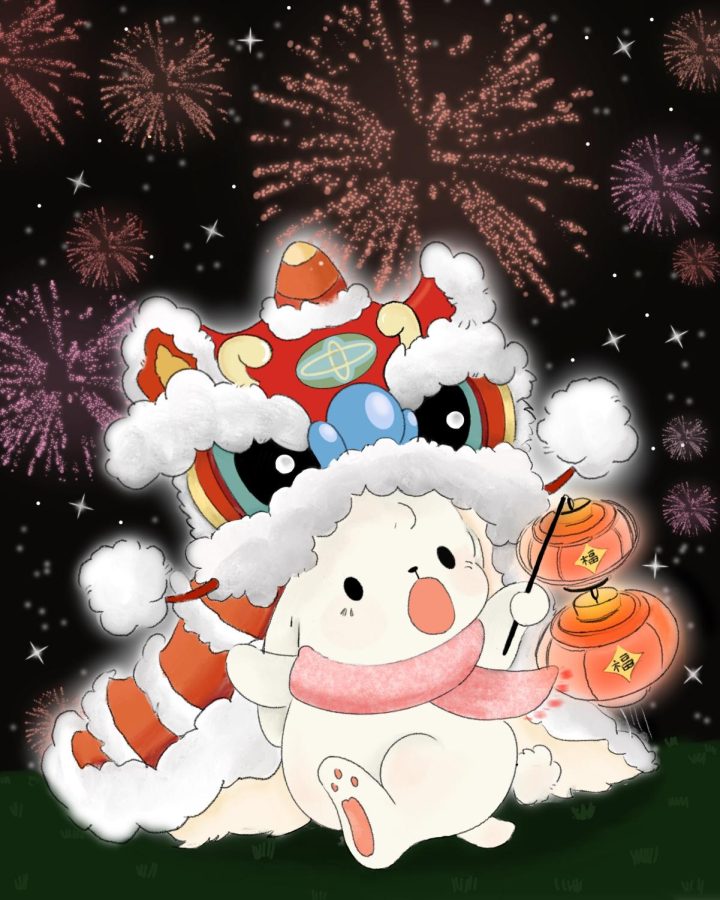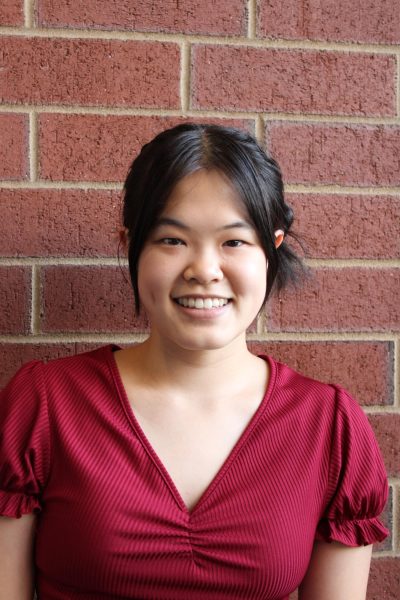Celebrating Lunar New Year in the Wake of Gun Violence in the Asian Community Part 1
A drawing of a rabbit with traditional Wǔ shī(舞狮) costume and Dēnglóng(灯笼). Wǔ shī(舞狮) is costume worn for Shīziwǔ(狮子舞), or the Lion Dance. Illustration made by Linda Wang.
February 15, 2023
On Jan. 22, billions around the world celebrated the start of the Year of the Rabbit. Although commonly referenced as Chinese New Year, the Chinese were not the only people celebrating; Celebrations take place in Japan, Korea, Thailand, Tibet, Vietnam, and Singapore – each one commemorating the Year of the Rabbit. For 15 days, friends and family gather from all over and enjoy the traditional festivities, with the overarching theme being reunion and joy.
Festivities and Traditions
A couple of days before the New Year, people hang up red couplets, lanterns, and biān pào (鞭炮), which are firecrackers.
The Eve before the New Year, Asian families gather together for a reunion dinner, nián yèfàn (年夜饭). This meal consists of traditional foods like dumplings, fish, chicken, pork, hand-pulled noodles, and niángāo (年糕). On the first day of the New Year, the children receive hóngbāo(红包), or red packets filled with money.
Evie Zhang is a Chinese American junior at State High who has experienced Lunar New Year celebrations in China and the US.
“It’s like Thanksgiving for Chinese people. People will come to their hometown from all over – in our case overseas to go back to China,” Zhang exclaimed. “It’s this whole reunion, seeing people that you love but you don’t get to see often. You [get] to see all the people you love, because everyone is there, and everyone is celebrating.”
Days 2-7 are for visiting relatives and friends. Sometimes, this can be having a vacation with each other, or just visiting home. Typically by the 8th day, people return back to work.
Day 15 is the last day of celebrations, called Yuánxiāo jié (元宵节), also known as the Lantern Festival. On that day, families gather together to eat a type of sticky rice ball with a sweet filling, usually, red bean paste, called Tāngyuán(汤圆).
Mengyun Chen is an international Penn State student who also helps out at the H.O.M.E. office at State High. She grew up in China and had fond memories of her family’s celebrations.
“我们会有一个【叫】小年【的日子】, 大概在大年二十几的时候, 就算一个小小的开始【过年】。 那天, 可能吃一顿[晚]饭。 然后, 大家就开始准备–因为那时还没有放假–大家就开始买年货, 买东西。大家开始买东西放冰箱,然后开始买贴窗, 包括对联 还有什么的。 然后还有红包, 还有买鞭炮。一切都是红的,然后包括鞭炮什么的。 鞭炮是用来除夕夜把年兽吓走. [We have a small celebration before the New Year, probably in the twenties of the Lunar December, which can be considered as a small start. On that day, we have a big meal. After that, everyone begins to buy things – because the holiday break hasn’t started yet – everyone starts to buy New Year’s goods and decorations. Everyone starts to buy things to put in the refrigerator, and window decorations, including couplets and whatnot. Then there are red envelopes and firecrackers. Everything is red, and that includes the firecrackers. Firecrackers are used to scare away the Nian beast on New Year’s Eve],” Chen explained.
China is a large country, filled with billions of people that have their own way of celebrating.
”有些地方在大年中午吃饭,不一定在晚上吃饭。 其实是不一样的, 比如说, 福建地区,就是【中国地图上】下面的那一块,我们就大概是半下午左右吃饭。 我知道【也】有一些地方【如】安徽中部【就】会中午吃饭, 所以就很depend大家这个的传统。吃完饭以后,大家一起看春晚,当然, 这几年春晚不好看。【在】那一天, 你一般【像】元宵【节】就是每个【地方的】卫视都会有自己的节目, 就春晚是统一的。基本上大家会看春晚,然后,大家可能会打打麻将,打打牌,然后就是聊天,嗑瓜子。 因为人很多,也不能说大家会这样. [At some places people eat at noon on New Year’s Eve, not necessarily at night. In fact, it is different. For example, Fújiàn on the map is in the southern portion of the country, and we eat around mid-afternoon. I know that in some places, like in central Ānhuī, people will have their celebratory meal at noon, so it depends on the tradition in that local area. After dinner, everyone watches the Spring Festival Gala together. However, the Spring Festival Gala has not been good in recent years. During days like the Lantern Festival, every local satellite TV has its own program, however, on the first day of the New Year, all the TVs play the same thing– the Spring Festival Gala produced by CCTV. Basically, everyone will watch the Spring Festival Gala, and then, some people may play Májiàng and cards. People will also be chatting and eating sunflower seeds. Because there are so many people, I can’t say that everyone will do this],” Chen stated.
Lunar New Year celebrations in China have a way of sticking with people. Zhang was able to celebrate once in China when she was younger, yet she still remembers the whole experience with extreme clarity.
“It was a lot of fun, a core childhood memory. Our whole extended family [got together]. In Chinese fashion, there were so many people, and I’m a people person. I like it when it’s loud and there are a lot of people. [Since] I knew most of them, I got a lot of money over that night and the next morning. Then, we made duì lián(对联)[couplets]. I didn’t really help; I sat there and watched, but I was there. We set off fireworks when it got dark at night,” Zhang described. “I just loved the atmosphere, because I love being Chinese and Chinese culture. So because [Lunar New Year] doesn’t coincide with winter break, I haven’t been able to do it since. But, I still love it so much. Sometimes, I wish I could go back…even if I don’t get as much money as before,” she added.
Students’ Celebrations
While the first day of the New Year was on Jan. 22, student celebrations started a week before that date, with the first activities being decorating with Tiēzhǐ (贴纸) and Jiǎnzhǐ (剪纸). Maggie Wang is a freshman at State High and has been celebrating Lunar New Year with her family her whole life.
“Around Chinese New year, we would hang up traditional Chinese Dēnglóng (灯笼) and Fú zì de tiēzhǐ (福字的贴纸). We also have these Chūnlián (春联) that we put on our doors,” Wang described. “My mom would make a big feast. We would have a lot of fish, a lot of shrimp. We would have traditional Chinese dishes. For dessert, we also make Niángāo (年糕). It’s very good. We eat a lot of food [from] all over China.”
Zhang has similar celebrations she does with her family.
“So our actual lunar tradition is 50/50. We either have dumplings or hotpot. No one knows; we decide [the] day of. But on Yuánxiāo jié (元宵节), we always have Tāngyuán(汤圆), for both breakfast and dinner, because that’s something we do,” Zhang stated.
“Now that we don’t go back and visit family, that’s all we really do. It’s just food. We [do] video call parents, the whole, ‘啊, 过年好!兔年大吉!万事如意! 恭喜发财!’ [Happy New Year! Best wishes for the Rabbit Year! May all go well for you! Wish you good fortune] [and] all of that,” Zhang added, “I don’t really get money anymore, since I’m so far away. But it really is [the] food. In my family, a lot of things are food-. A lot of our love languages is through giving food, and making food for other people.”
Although far away from their roots, Lunar New Year is still a time filled with joy for students who celebrate.


